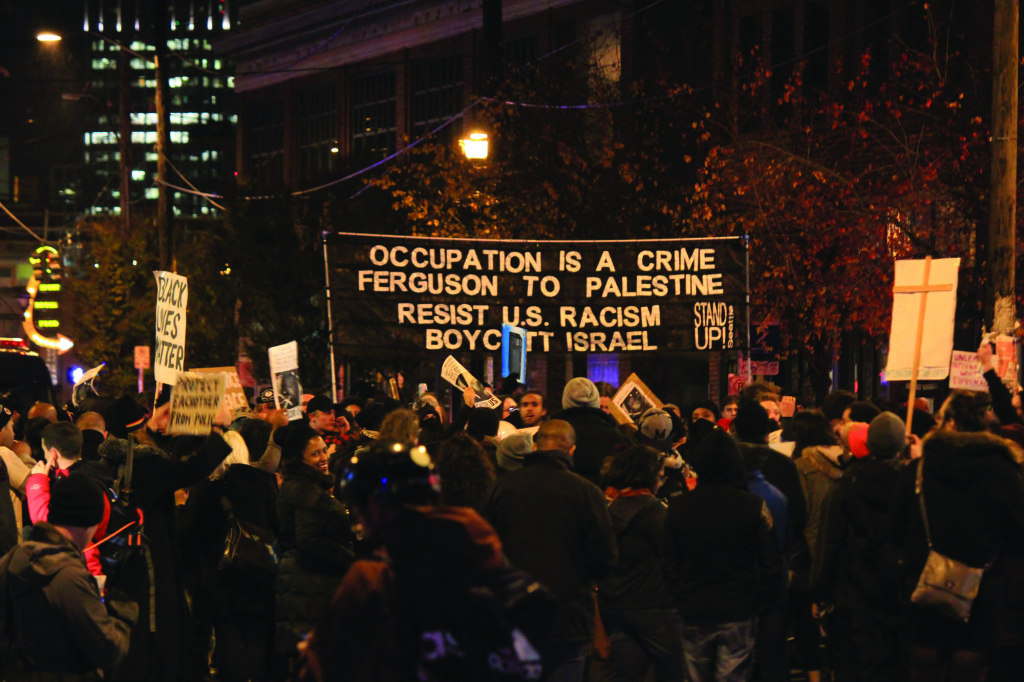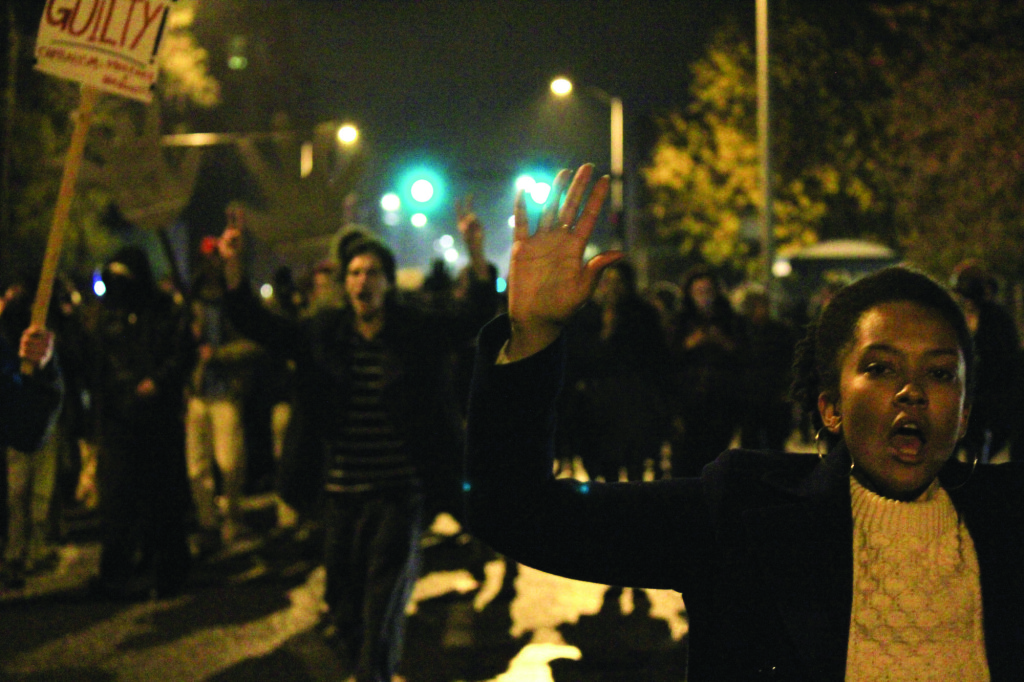The grand jury decision on Nov. 24 not to indict Darren Wilson, the white police officer who fatally shot Michael Brown, an unarmed African-American teenager in Ferguson, MO., ignited nation-wide protests. In Seattle, hundreds took to the streets to demand justice for Michael Brown while others reflected about what the decision means for racial profiling in our country’s police system.
For many, this event was confirmation of several troubling realities—that the judicial system does not protect all lives equally, that institutional racism exists at a frightening level.
News of the decision broke while an interfaith service for Michael Brown was taking place on Seattle University’s campus. The event was part of an ongoing Seattle U project to raise awareness surrounding issues of racial justice called Moral Mondays at SU.
“Some people wept, some people were angry, and some people just wanted to be in a space where they could pray,” said Tyrone Brown, the event’s coordinator and a Seattle U staff member.
According to Tyrone Brown, many in Seattle relate to the pain those in Ferguson feel. Seattle itself has a history of racialized policing and institutional racism.
“We’ve had incidents of our own Michael Browns,” Tyrone Brown said.
He mentioned a case in 2010 when a Seattle police officer fatally shot John T. Williams, a Native American woodcarver who was, at the time of the shooting, holding a knife.
Police bias against minorities is something that former Seattle police chief, Norm Stamper, knows well. In his 2006 book chronicling the culture of racism, sexism and homophobia in 21st-century police forces, Stamper wrote, “Simply put, white cops are afraid of black men.”
Missouri has a well-documented history of institutionalized racism. But according to Tyrone Brown, racism has morphed into something much more insidious, and people in Ferguson are demanding change.
Many of those demands are cries for change in the community’s police force.
“Ferguson is ground zero for change in American policing,” said Edward Reed, an adjunct professor in the criminal justice department. “[Ferguson] is sort of begging for change—that police really get to know people in their community and treat them like human beings.”
Both Reed and Tyrone Brown were disappointed about the decision, though unsurprised. They also mentioned that racism is just one facet of this situation, and that the outrage over Michael Brown’s death taps into broader and more complex concerns.
“There’s a lack of understanding of poverty in America, police in society, African American culture and just the dynamics of classism,” Reed said.
He added that police often do not deal with conflict appropriately and that the first tool to diffuse a situation should be a police officer’s voice instead of hasty violence. Most police departments, including the Seattle Police Department, only require officers to have a high school degree, which attracts a subset of people that may not be informed about social justice issues, according to Reed, because they are so young.
“If you’re recruiting from a subset of people in society, you’re attracting a subset of people who are into adventure, people who are politically conservative, [and] not into social justice and certainly lack patience with social justice,” Reed said.
Both Reed and Tyrone Brown view the protests in Seattle as a positive means to practice civil disobedience and increase education about racial bias. According to Tyrone Brown, the black community historically could have reacted much more violently to many injustices. He is proud of the protests and views them as a positive reaction to oppression.
“It’s a healthy outlet for democracy and it’s a good thing that Seattle is doing,” Tyrone Brown said.
Sophomore Representative Palmyra (Myra) Jackson said she loved the Seattle response and that the protests show that society does not need to resort to violence to enact change. While there are certainly some who have resorted to violence, the vast majority of protesters have been peaceful.
Jackson worries, however, that this movement may simply be a fad, and will not have a lasting effect.
“If you’re going to join a movement, join it wholeheartedly,” Jackson said. “It needs all your attention and all your will and if we all devote ourselves to something we have passion about, then hopefully we can have change.”
But healthy change can also be created on a smaller scale, even within the Seattle U community. Brown suggested that students must change their language and perceptions about our surrounding neighborhoods. In conversations with students, Brown has discovered that there are certain areas around campus, such as south of Jefferson, that are considered “bad” and full of crime.
Reed said that when the language in our own community contributes to discrimination and twists perceptions about the people who live around us, it can affect how police officers deal with these neighborhoods.
As for Ferguson, its police department is currently the subject of a civil rights investigation. And now one officer short. Wilson resigned just days after the grand jury decision. Whether that move will affect public trust of the police remains to be seen.
“[This issue] is not about Darren Wilson being racist,” Tyrone Brown said. “It is about him growing up in a racist culture.”
Melissa may be reached at mlin@su-spectator.com










